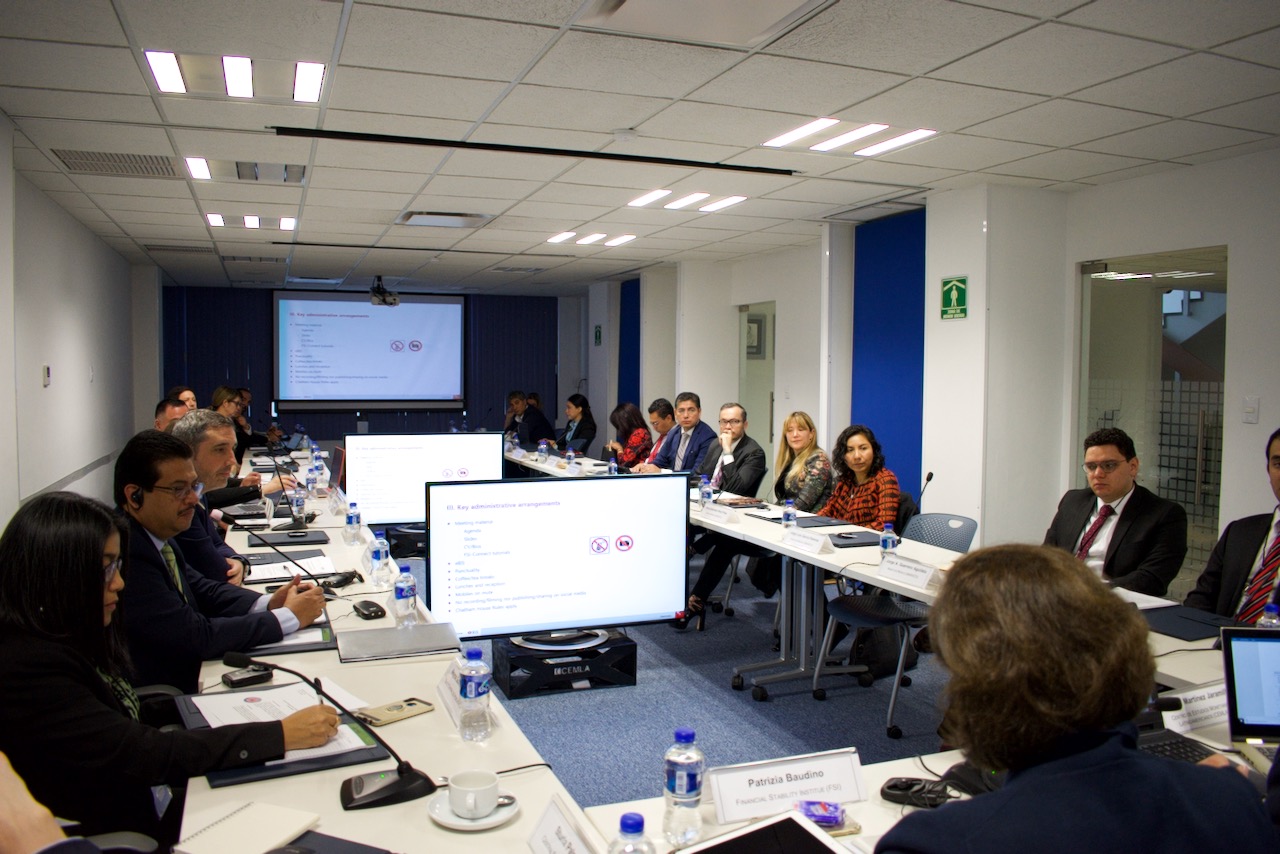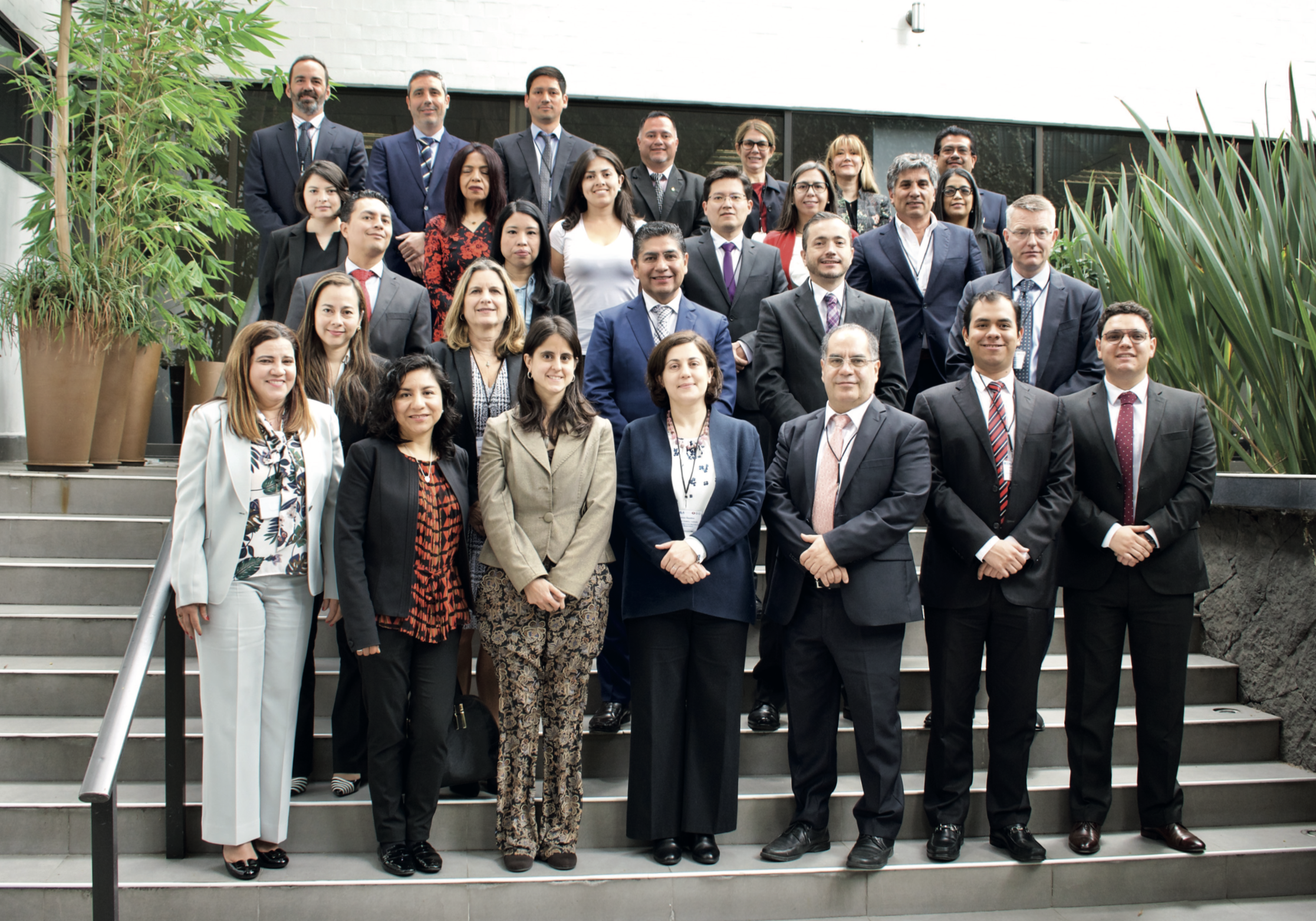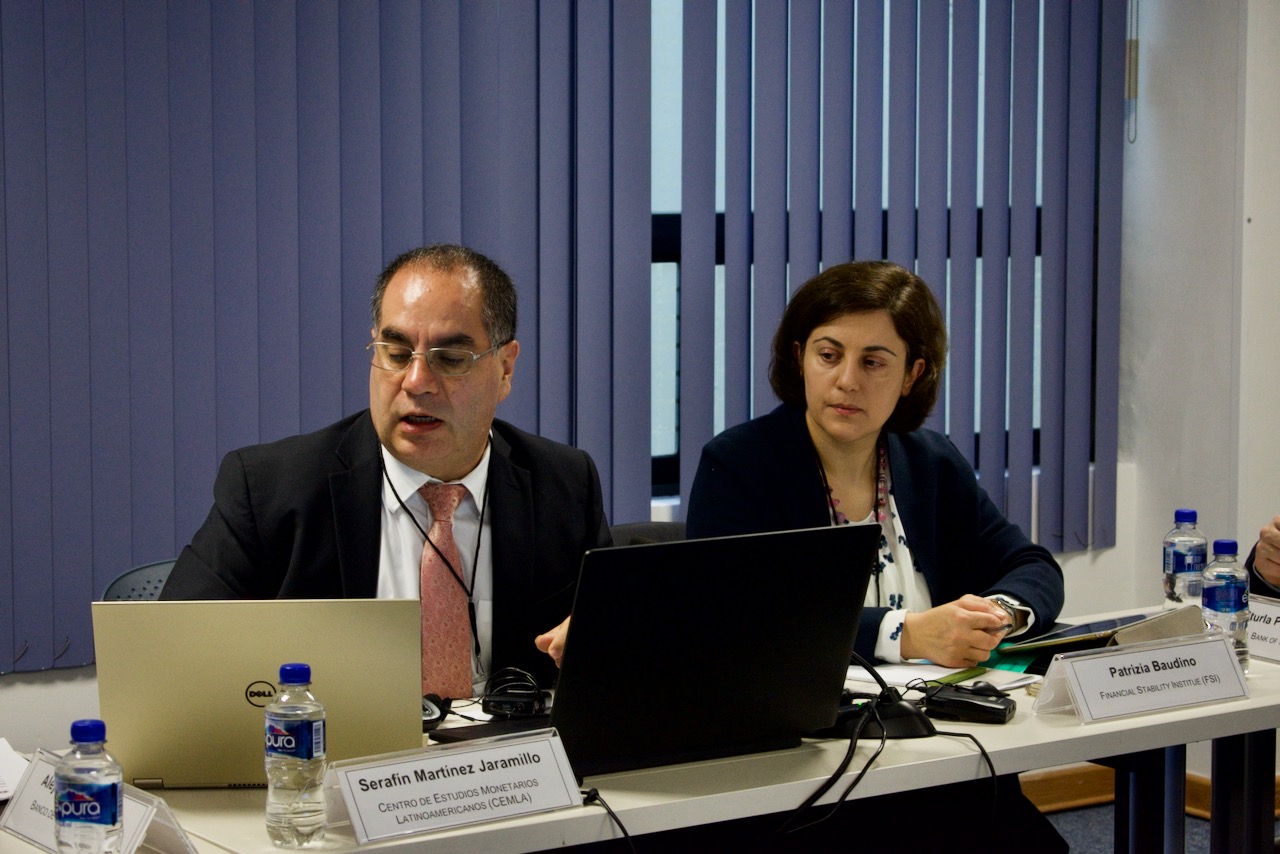CEMLA-FSI Policy Implementation Meeting on Crisis Management
Mexico City, Ocotber 16–17, 2019
The CEMLA-FSI Policy implementation meeting on crisis management was held in Mexico City on 16 and 17 October 2019. Jointly organized by the Financial Stability Institute (FSI, for its acronym in English) and the Center for Latin American Monetary Studies (CEMLA).
The meeting was attended by 29 delegates from 23 institutions, including central banks and banking supervisory authorities in North America, Central, South, and the Caribbean, as well as the participation of Spain. The aim of this meeting was to discuss standards and international legal framework of Basel III and to exchange experiences and lessons learned from dealing with bank failures, the role of lenders of last resort and considerations on financial stability; and the role of the deposit insurance funds, as well as the recovery plans and resolution; and coordination between the relevant supervisory authorities and central banks.
The following summarizes the key findings that were exchanged at the meeting:
After the Global Financial Crisis and the consequences that this left, the FSB considered important to issue an updated version (2014) document about the Key Attributes of Effective Resolution Regimes for Financial Institutions. The aim of this document is to improve the implementation for an adequate crisis management and to maintain financial stability in different jurisdictions. This document contains 12 important attributes that contribute to crisis resolution for all jurisdictions.
Such resolution plan should consider the specific actions that the authorities should take to face the obstacles, identify barriers for effective strategy implementation, and provide an ex-ante assessment, as a basis to explain the proposed strategy.
Nowadays, the main challenges to implement the proposed by the FSB are:
a. Territorial and complexity limitations. Banks with global operations represent a challenge because of its large complex operations structures, territorial cooperation, data collection and boundaries regarding resolution mechanisms or tools, in addition to the national interests existing in the resolution process.
b. Assessment. Assess indicators to monitor banks before a failure. Monitoring it’s also important for the implementation of domestic plans resolution, which has to be consistent with the parent company plans. Additionally, it is important to apply proportionality measures for the resolution plan, distinguishing by bank size and complexity.
Welcome remarks
Serafín Martínez Jaramillo, CEMLA
Patrizia Baudino, Financial Stability Institute (FSI)
Session 1: Standards and legal frameworks
This session provides an introduction to the PIM, by covering the relevant global standards for dealing with failing banks, including TLAC, the capital requirements for GSIBs, and the FSB Key Attributes. The session also includes an overview of the legal regimes for bank insolvency, based on a review of selected country practices by the FSI, and an introduction on the role of deposit insurance schemes in crisis management.
Sonia Morey, Canada Deposit Insurance Corporation (CDIC)
Patrizia Baudino, Financial Stability Institute (FSI)
Session 2: Experience in dealing with failing banks – challenges and lessons learnt
This session is dedicated to learning from the experience of dealing with failing banks in different jurisdictions, also looking at different types of banks (ie, banks that operate cross-border and smaller, domestically focused banks).
Iván Fernández, Bank of Spain
Hugo Libonatti, Bank Savings Protection Corporation (COPAB), Uruguay
Iliana Moreno Vega and Rubén Lechuga Ballesteros, Institute for the Protection of Bank Savings (IPAB), Mexico
Session 3: The LOLR function in crisis management and financial stability considerations
The response to failing banks involves various authorities and functions, and this session focuses on the perspective of central banks, and in particular on how they can activate lender-of-last-resort functions when dealing with failing banks. Safeguards for the central bank operations are essential for its capacity to intervene while protecting its balance sheet, and speakers will reflect on constraints and experiences in their institutions.
Jorge Luis García Ramírez, Director of Financial Stability, Bank of Mexico
Reyna Carolina Gómez Escobar, Central Bank of Honduras
Sturla Palsson, Central Bank of Iceland
Session 4: Tour de table on current approaches to crisis management
All participants are invited to share views on challenges they have recently faced in relation to bank crisis management, and possibly changes in their resolution frameworks to address such challenges.
Session 5: Safety nets (Deposit insurance funds and resolution funds) – mandates and options for supporting crisis management
In dealing with a failing bank, insured deposits must be protected, and if the bank performs some critical functions, those can be preserved via orderly bank resolution. Countries have taken different approaches to establishing deposit insurance schemes and resolution funds, and the session can shed light on practices and rationales for the differences.
Luis Maldonado Marquínez, IPAB
María del Pilar Galindo, Fondo de Garantías de Instituciones Financieras, FOGAFIN
Sharon Yore, Federal Deposit Insurance Corporation (FDIC), USA
Session 6: Resolution and recovery planning
Preparedness for closing down a bank relies on several aspects, of which resolution and recovery planning is a key component. The FSB recently completed a thematic peer review on resolution plans, which sheds light on the variety of approaches and challenges that authorities have encountered. Presentations by the speakers also highlight the implementation of these plans across different types of banks.
Sonia Morey, CDIC and FSB
Hugo Libonatti, COPAB
Vicente Vargas González, IPAB
Session 7: Coordination and cooperation among relevant authorities (eg, home/host issues, supervisory authorities and central banks)
Dealing with a bank crisis management in an effective way requires good cooperation among several authorities, such as deposit insurance authorities, resolution authorities, central banks, supervisors, ministries of finance, and, to the extent that the failing bank operates across borders, counterparts in the host countries. Such multi-faceted coordination can raise challenges, and speakers will discuss their experience with it.
Iván Fernández, Bank of Spain
Juan Pablo Graf, Ministry of Finance and Public Credit (MHCP), Mexico
Sharon Yore, FDIC
Serafín Martínez Jaramillo, CEMLA
Serafin Martinez-Jaramillo is a senior financial researcher at the Financial Stability General Directorate at Banco de México and currently he is an adviser at the CEMLA. His research interests include: financial stability, systemic risk, financial networks, bankruptcy prediction, genetic programming, multiplex networks and machine learning. Serafin has published book chapters, encyclopedia entries and papers in several journals like IEEE Transactions on Evolutionary Computation, Journal of Financial Stability, Neurocomputing, Journal of Economic Dynamics and Control, Computational Management Science, Journal of Network Theory in Finance and some more. Additionally, he has co-edited two books and two special issues at the Journal of Financial Stability. Serafin holds a PhD in Computational Finance from the University of Essex, UK and he is member of the editorial board of the Journal of Financial Stability, the Journal of Network Theory in Finance and the Latin American Journal of Central Banking.
Patrizia Baudino, FSI
Patrizia Baudino is a Senior Advisor at the FSI, which she joined in April 2016. She focuses on macroprudential issues for banks and she represents the FSI in the BCBS Macroprudential Supervision group.
Prior to joining the FSI, Patrizia was an Advisor at the European Central Bank, which she joined in 2002, and where she held a number of positions in the International and Financial Stability directorates. At the ECB, her work focused on macroprudential policies and financial stability. She was involved in various rounds of EU-wide stress tests for banks and insurance companies, and she represented the ECB in Financial Assistance Programmes for some EU countries. Patrizia spent three years (2007-2010) on secondment to the Financial Stability Board, where she contributed to the FSB activities in response to the financial crisis. Patrizia holds a PhD in Economics from Princeton University.
Sonia Morey, Manager, Resolution Planning, Canada Deposit Insurance Corporation (CDIC)
Sonia Morey joined CDIC in 2017. She is responsible for guiding the Canada’s Domestically-Systemically Important Banks (D-SIBs) in their resolution planning activities and assessing their resolution plans.
Prior to joining CDIC, Sonia has held several management positions in Risk Management, Capital Markets, Group Compliance and AML/ATF, Treasury, Emerging Markets, and Retail and Commercial Banking at the largest Canadian banks, working with Senior and Executive Management. In the course of her functions, Sonia has travelled throughout Latin America and the Caribbean to monitor operational activities, and maintain relationships with foreign regulators, central banks, domestic banks, and other stakeholders.
Sonia holds a Masters’ degree in Economics from McGill University in Montreal, and a Global Professional Master of Laws (GPLLM) from the University of Toronto, Faculty of Law.
Iván Fernández, Bank of Spain
Iván Fernández is Head of Unit at Bank of Spain (BoS). He is in charge of the resolution planning for Significant Institutions in close cooperation with the SRB. He also cooperates in the drafting of the resolution plans for the rest of Spanish institutions and helps the Director General in the preparation of the different high level committees he is part of. He is the BoS member within the EBA subgroup on resolution preparedness (SGRPP).
He joined Bank of Spain in 2005 as part of the Supervision Directorate, after having passed a public examination as credit institution inspector. Within this Directorate, among other tasks, he led the PMO of AQR exercise for Spanish banks, took part in the financial design and monitoring of the so called “bad bank” (SAREB) and actively participated in the development of BoS internal stress test tool (FLESB). All these tasks were carried out during the financial crisis, which began in 2008 and affected several Spanish banks. At that time he was also involved in the design of restructuring plans for various banks that were granted public support.
Before being appointed Head of Unit in resolution tasks he was the Director of the internal audit department of Hunosa S.A. main company in coal mining under whose umbrella are grouped different coal mines that were rescued by the public sector. The company's objective was to manage the orderly closure of rescued companies while avoiding the adverse effects that abrupt closure could have on the real economy.
More recently, as Head of Unit, he actively participated in the first resolution process of a European bank (Banco Popuar) under the new regulatory framework of the Resolution Directive (BRRD).
Hugo Libonatti, Bank Savings Protection Corporation (COPAB), Uruguay
Hugo Libonatti has been serving as Vice President of the Corporación de Protección del Ahorro Bancario (The Banks Savings Protection Corporation- Uruguay) since September 2009.
Upon to this date the Deposit Insurance Scheme (DIS) was housed in the Central Bank and Mr Libonatti acted as a Vice President of the Commission that managed the Deposit Insurance Fund. Thus, since 2005 he has worked actively in the starting-up and implementation process of the DIS in Uruguay.
Before joining the DIS, Hugo Libonatti worked in an international private bank (Montevideo branch) for more than 25 years in the areas of banking regulation and supervision, audit and accounting.
Regarding IADI’s responsibilities, Mr. Libonatti co-chaired the Subcommittee on “Early Detection and Timely intervention for Deposit Insurance Systems”, whose main outcome was the “General Guidance on Early Intervention and Timely intervention for Deposit Insurance Systems”, issued on April 2013. He has also been member of other subcommittees. Since 2016 Hugo Libonatti is IADI Executive Councilmember and since 2018 is also serving as a Chair of IADI-Latin American Region Committee (LARC).
Mr Libonatti holds an economics degree from the University of the Republic/Uruguay and he has also gotten a Master’s degree in International Economics from the same University.
He has also studied Development Economics and holds a Master’s degree in that area (2004-2005) from the Universidad Carlos III- Spain.
He reads, writes and speaks English and Italian. Spanish is his native language.
Iliana Moreno Vega, Institute for the Protection of Bank Savings (IPAB), Mexico
Ms. Iliana Moreno Vega serves as Head of Legal Affairs for Banking Savings Protection at the Institute for the Protection of Bank Savings (IPAB), Mexico’s deposit insurance and banking resolution authority, where she has built a professional career since 1999.
Ms. Moreno is in charge of overviewing the legal aspects of asset recovery, liquidation procedures and court-ordered liquidation measures of banking institutions, as well as for the implementation of deposit reimbursement actions, and the development of resolution plans. Likewise, Ms. Moreno has participated in the bankruptcy and liquidation proceedings of 12 commercial banks.
Ms. Moreno is part of the working group of Mexican financial authorities in charge amending the banking regulation for banking resolution and insolvency, in which she is a constantly active participant.
During 2015 and 2016, she worked for the National Banking and Securities Commission, Mexico´s banking supervisory agency, where she was in charge of legal authorizations for financial institutions.
Iliana Moreno holds a Master’s Degree in Financial Law Institutions from Universidad Panamericana, as well as a Bachelor’s Degree in Law from Escuela Libre de Derecho.
Rubén Lechuga Ballesteros, Institute for the Protection of Bank Savings (IPAB), Mexico
Mr. Lechuga serves as Head of Reimbursement and On-site Reviews at the Institute for the Protection of Bank Savings (IPAB), Mexico’s deposit insurance and banking resolution authority. He is tasked with coordinating reimbursement procedures to depositors in case a payout is declared as a banking resolution, as well as for assessing the quality of information on savings and depositors furnished by banks through periodic on-site inspections.
By developing and implementing technological information management tools to increase IPAB’s response capabilities, he played an active role in the reimbursement process that derived in an international recognition being awarded to IPAB as Deposit Insurer of the Year 2014.
He has over 25 years of experience working in the financial sector, both in private and government entities, leading different teams of professionals in Credit, Asset Recovery and Banking Supervision departments.
Mr. Lechuga is a PhD candidate in Public Administration from Universidad Anáhuac and holds a Masters in Finance from Newport University, as well as a B.A. in Management from Universidad Nacional Autónoma de México. He has also completed a Program in Executive Finance Management from Escuela de Alta Dirección y Administración (EADA) in Barcelona, and an Executive Management Program in Instituto Panamericano de Alta Dirección de Empresa (IPADE).
Jorge Luis García Ramírez, Director of Financial Stability, Bank of Mexico
Jorge L. Garcia is currently the Financial Stability Director at Banco de México. He joined Banco de México in 2000. Since then, he has participated in several projects related to financial regulation and financial stability. Since 2010, he represents Banco de México in the Working Group on Liquidity of the Basel Committee on Banking Supervision (BCBS), and is currently the central bank representative at the BCBS Policy Development Group (PDG), the FSB Cross Border Crisis Management Group, as well as in other international coordination and cooperation initiatives. He has been extensively involved in the Mexican policy design of the prudential regulation on liquidity risk management and liquidity requirements, as well as on the design of the central bank liquidity facilities. He participated in the design of the overall special resolution regime for banks and represents Banco de México in several crisis management groups of international banks. Born in Guadalajara, Mexico, he received his B.A. in economics from the Instituto Tecnológico Autónomo de México (ITAM) and a M.Sc. and Ph.D. in economics from the University of Rochester.
Reyna Carolina Gómez Escobar, Banco Central de Honduras
Reyna Gómez joined to Central Bank of Honduras in July 2003. Currently, she is head of Accounting and Central Securities Depositary Division, full in charge of government securities and instruments used to provide liquidity facilities to the financial system.
Since 2011, she has been member of the Automatization Monetary Policy team in order to implement the RTGS and CSD systems and related applications.
Also she has been in charge of monitoring the residual assets owned by the BCH as a result of loans granted to banking institutions, before being declared in forced liquidation.
Previous to work for BCH, Reyna gained a strong experience as external auditor when she was part of the KPMG staff. Commercial, financial and insurance where the scopes she worked.
Sturla Palsson, Central Bank of Iceland
Mr. Sturla Palsson joined the Central Bank of Iceland (CBI) in 2001, having previously held positions at Íslandsbanki, Statistics Iceland, and the CBI. He was appointed Director of the CBI’s Treasury and Market Operations Department in 2005. His responsibilities in that capacity include domestic market operations, foreign reserve management, and sovereign debt management as an agent of the Treasury of the Republic of Iceland.
From the beginning of the Icelandic financial crisis in 2007, Sturla was actively involved in crisis management, reorganising the framework around market operations, reserve management, and government debt. Over the period from 2008 to 2019, he worked on introducing, enforcing, and liberalising capital controls in Iceland, as well as rebuilding the domestic financial system, in close collaboration with the Icelandic authorities, the IMF, and the private sector.
From 2009 to 2016, Sturla served on the board of the Central Bank of Iceland Holding Company, which was established to manage and recover assets taken over by the CBI and the government in the wake of the financial crisis.
Luis Maldonado Marquínez, IPAB
Mr. Luis Maldonado Marquínez currently serves as Deputy Secretary for Legal Affairs at the Institute for the Protection of Bank Savings (IPAB), Mexico’s deposit insurance and banking resolution authority.
As part of his current position, he is tasked with the legal representation of the Institute and with coordinating the work of the legal departments for Bank Savings Protection, Contentious Procedures and Regulatory Consultation. In addition, he leads the development, review and update of guidelines, agreements, internal rules and law initiatives.
Previously, Mr. Maldonado acted as Head of Social Communication, Head of Legal Affairs for Banking Savings Protection and Senior Legal Manager for Banking Resolutions at IPAB.
Before joining IPAB, he worked for the International Legal Department of the Mexican Central Bank, as well as for Mancera, Ernst&Young.
With over 17 years of experience working in financial sector, Mr. Maldonado has developed a solid and vast experience in deposit insurance and banking resolutions, recovery of assets, financial contracts and cooperation agreements.
Luis Maldonado holds a Master’s Degree in Law & Economics from the Instituto Universitario Ortega y Gasset, as well as a Bachelor’s Degree in Law from Universidad Iberoamericana.
María del Pilar Galindo, Fondo de Garantías de Instituciones Financieras (FOGAFIN), Colombia
María del Pilar Galindo is a lawyer and political scientist from the University of Los Andes, specialist in Financial Law at the Javeriana University and a specialist in Spanish Law of the University of Alcala de Henares. María del Pilar began her professional life in the private sector in a financial institution but have devoted most of her professional life to the public service, mostly in the role regulation and policy design of the financial system in the Minister of Finance of Colombia. She currently serves as Deputy Director of Resolution Mechanisms in the Guarantee Fund for Financial institutions- Fogafín, where she is in charge of resolution strategies and crisis management preparedness.
Sharon Yore, Federal Deposit Insurance Corporation (FDIC), USA
Sharon Yore is the Associate Director, Resolution Strategy Branch in the Division of Resolutions and Receiverships, Federal Deposit Insurance Corporation (FDIC) and is responsible for overseeing the resolution process for failing institutions, including marketing and execution of resolution strategies for regional and community banks. During the financial crisis from 2008-2013, she was responsible for resolving 489 failed institutions and is considered a subject matter expert in determining resolutions strategies that result in the least costly transactions to the FDIC. Sharon has more recently been involved in resolution readiness planning for large banks, including a current project for onboarding senior executives and board members for a newly created bridge bank.
Sharon began her government career at the FSLIC in 1988 and continued on with the Resolution Trust Corporation (RTC) where she was responsible for marketing and selling failed thrifts. While at the RTC, Sharon was involved in developing and implementing many of the best practices that were later adopted by the FDIC.
Ms. Yore graduated from West Virginia University and holds a Bachelors of Science in Business Administration.
Vicente Vargas González, IPAB
Mr. Vargas currently serves as Head of Research and Institutional Affairs where he coordinates the development of research studies for deposit insurance and banking resolutions, the participation of IPAB in international events, and the financial education activities to promote public awareness of the protection of banking deposits in Mexico.
Previously, as a member of IPAB, he led a team charged with monitoring the liquidity and solvency conditions of banking institutions, and with assessing potential risks of failure. Mr. Vargas fashioned the projection model used by IPAB to forecast financial statements of banking institutions, in order to determine plausible adverse scenarios and estimate their impact. He has collaborated directly in the authorization procedures of recovery plans submitted by banks and in IPAB’s development of resolution plans.
Before becoming a part of IPAB’s team, Mr. Vargas worked for the National Banking and Securities Commission in numerous positions, performing both off-site examinations and on-site audit reviews of various types of financial institutions. He was a member of the team of specialists that designed and implemented the first stress test exercises for banks in Mexico.
Mr. Vargas has over 15 years of experience working for financial authorities and collaborating with multilateral organisms. He holds a BA in Economics from ITAM, Mexico and an MBA from EDHEC Business School, France, as well as an international certificate in banking risk and regulation from GARP.
Juan Pablo Graf, Head of the Banking, Securities and Savings Unit, Ministry of Finance and Public Credit (MHCP), Mexico
Pablo Graf started in this position in December 2018 and his responsibilities include coordination among financial authorities in the areas of regulation, supervision and policy formulation for the banking, securities and non-bank financial sectors.
Before this position he worked for the last 18 years in the financial system analysis area of Banco de México where his responsibilities included the analysis of risks and policy formulation in relation to the Mexican financial system. In this position he was involved in the implementation of Basel III in Mexico and represented Banco de México in the Basel Committee on Banking Supervision (BCBS) and the Financial Stability Board.
Before joining the Financial System Division of the Banco de México, he worked for three years (1997-2000) as Economist in the Monetary and Economics Department of the Bank for International Settlements (BIS).
He has a bachelor degree in Economics from the Universidad Autónoma Metropolitana and a master degree in Economics from the Cambridge University, UK.





